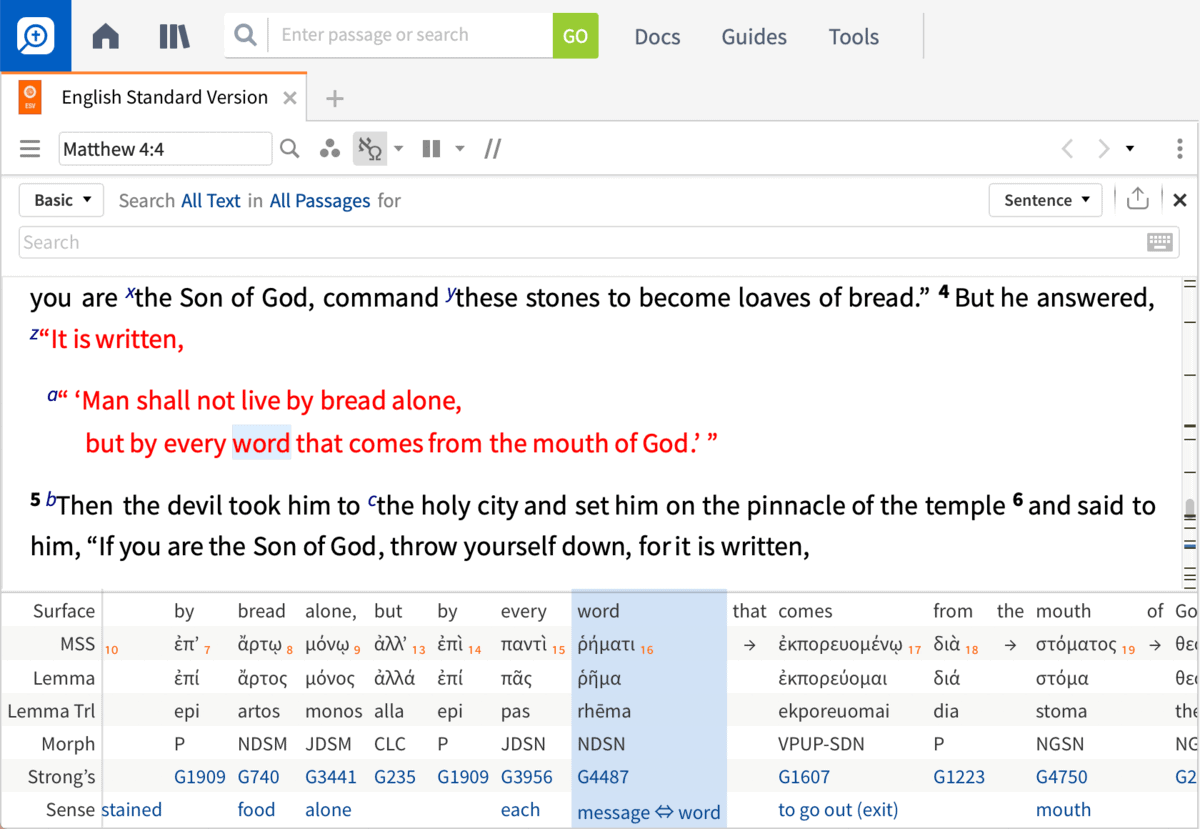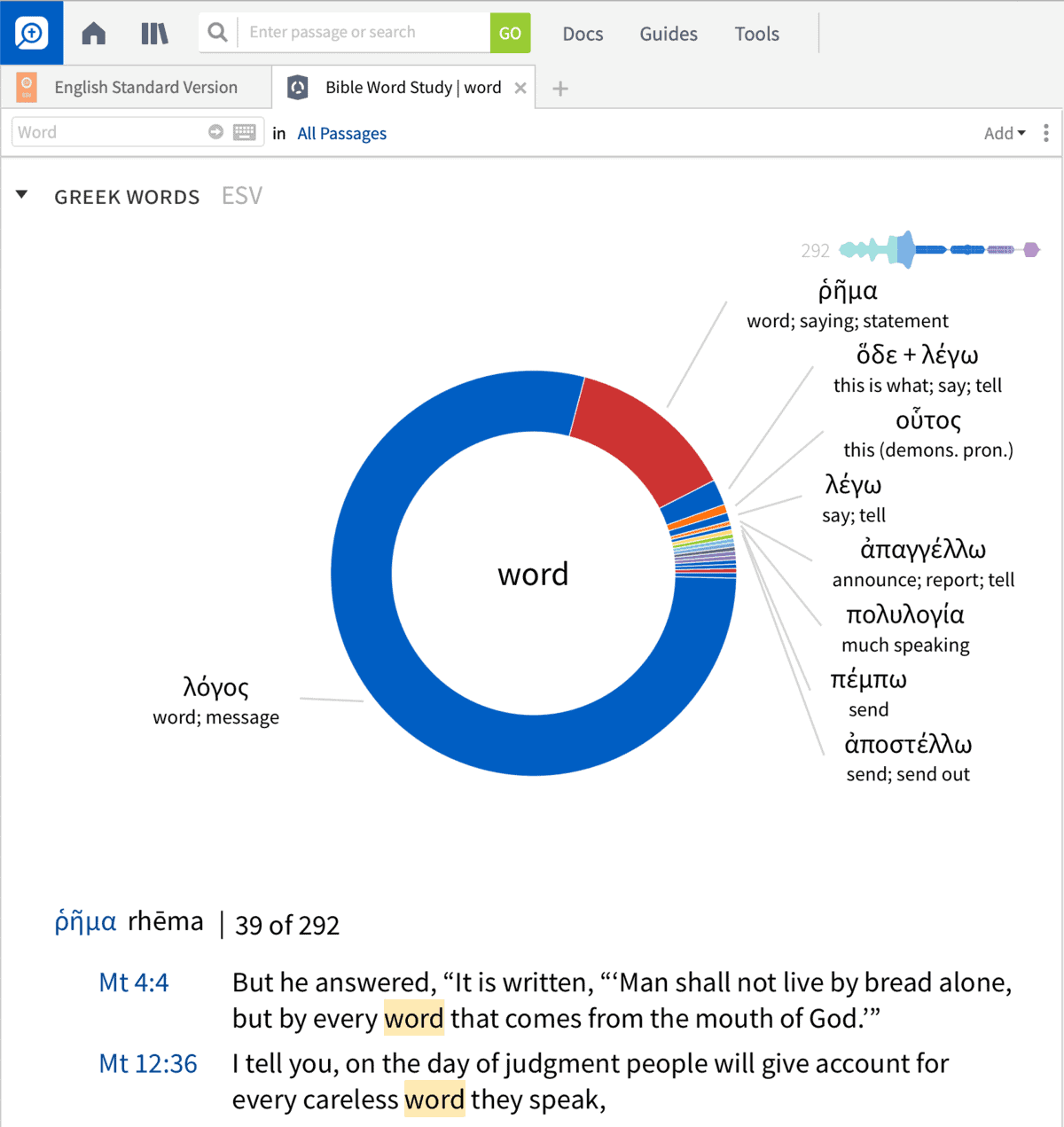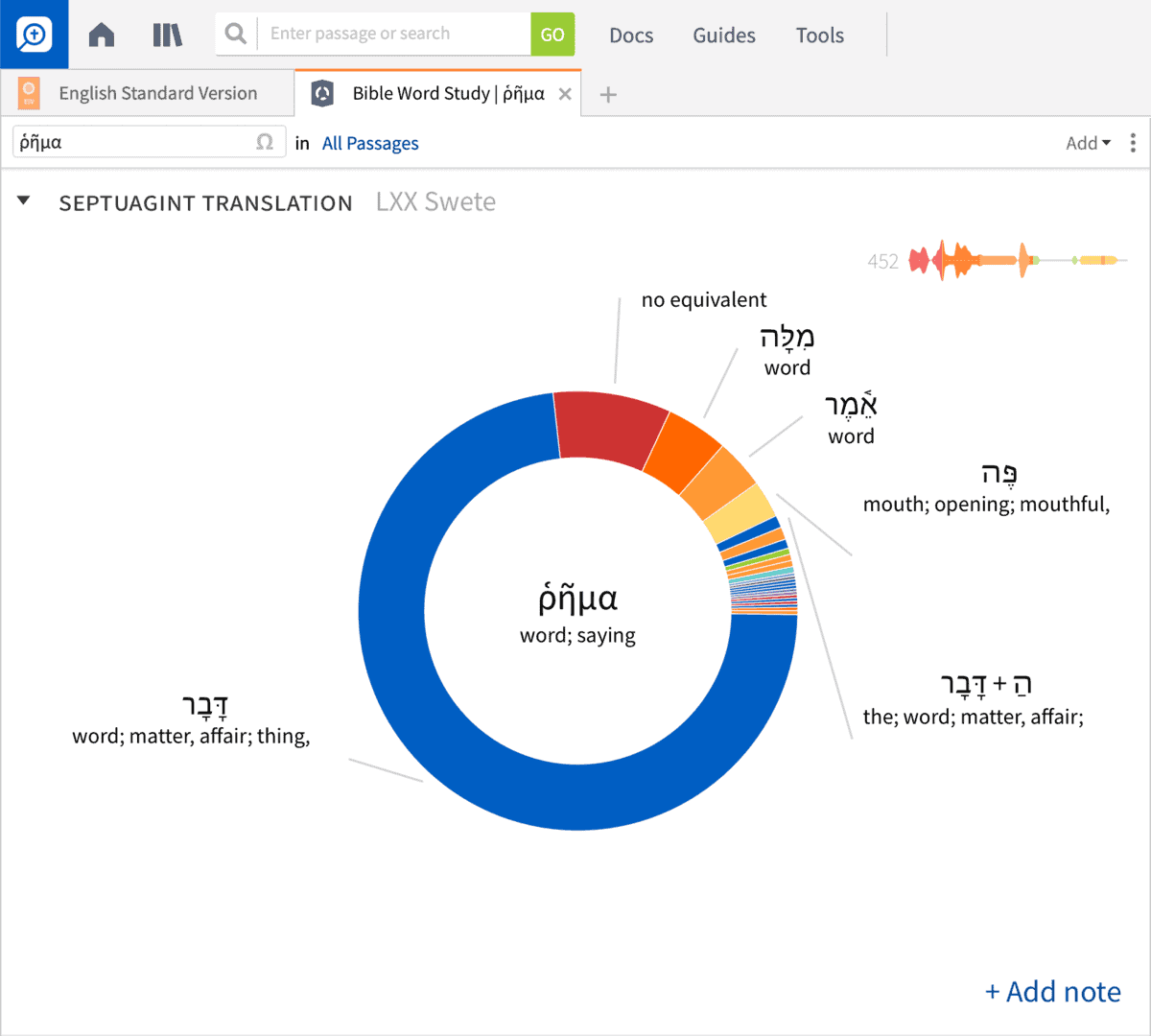Word studies are a treasure trove … and a minefield. Somehow you have to weave through the dangers to get the treasures. Think for a moment: if you were about to enter such a field, what would you want to know about first? The gold or the bombs?
I’d want to know about the treasures first: do they make it worthwhile to even bother learning about the dangers? And then I’d want a detailed accounting of the dangers—so I can live to enjoy the good stuff.
The benefits and goals of word studies
So here’s a quick account of the treasures in the word study field: you get to dig into rich and precious biblical concepts such as justification, repentance, reconciliation, redemption, salvation, even (surprisingly frequent) concepts like “going up.”
Notice, however, that I said “concepts,” not “words.” And that brings us to the dangers. One of the most common mines in the word-study field is mixing up those two things: you can’t just search for the word “joy” to find every time the Bible employs the concept of joy. Psalm 150, for example, is a psalm bursting with joy, but the word is never used. Likewise, the Greek word usually translated “evangelize” or “preach the gospel” (εὐαγγελίζομαι, euangelizomai) shows up in places where the concept of preaching the gospel is simply not present—such as 1 Thess. 3:6, where Paul speaks of Timothy “[bringing] the good news” about the Thessalonians’ faith and love. Words and concepts are not always tied tightly together.
Studying the use of a particular biblical word, however, is one of the major means by which you can get insight into major biblical concepts.
In this post, I’ll walk you through the steps you need to take to perform a Bible word study so you can better grasp biblical concepts—the building blocks of biblical understanding.
Look for a promising word
For our example, let’s say you’re studying Matthew 4 and you come upon verse 4.
But [Jesus] answered, “It is written,“ ‘Man shall not live by bread alone, but by every word that comes from the mouth of God.’”
As you’re reading through this verse, you wonder “Is there any significance to the use of the phrase ‘every word‘?”
This is a good candidate for a word study. By gaining a stronger understanding of the word “word,” you suspect you’ll have a better grasp of biblical concepts.
Identify the underlying Greek or Hebrew lemma
You can do word studies in English alone, but it’s not ideal—because, for various reasons, the same Greek word can be translated with multiple different English words; and the same English word may translate multiple Greek words! (The same is true of Hebrew words.)
But you can access the original languages of Scripture through a helpful tool called a reverse interlinear. A reverse interlinear rearranges the words in the Greek and Hebrew Bible to match those in our English translations. Logos includes an inline reverse interlinear that lets you customize the information you want displayed. (If you have a paper copy of a reverse interlinear, you can do something similar; all the information just won’t be so handy, and it will take you quite a bit more time to sort through the data.)
When you use the inline reverse interlinear in Logos, you’ll see a small pane under the biblical text. As you click each word, Logos provides the manuscript form of the word (or how the word appears in the Greek text), the lemma form (or how the word appears in an original language dictionary, called a lexicon), morphology of the word (or the details of the word, including parts of speech), and transliterations (or the Greek word transcribed using English letters so you can read it).
You’ll need at least some of that information to undertake your word study. Logos makes it easier by putting it all in the same place.
When you observe the text using the reverse interlinear (whether in Logos or elsewhere), you notice that “word” in verse 4 is not the Greek word you might expect. The interlinear tells us this word is “rhema.” If you’ve been in Christian circles long enough, this may strike you as odd: isn’t “logos” the Greek word for “word”? “Logos” is the name for our software in part because it’s one of those New Testament Greek words that many Christians know (along with “agape” and a few others).
But in Matthew 4:4 Jesus uses “rhema,” not “logos.” This is the kind of initial insight that can kick off your investigation.
Find every instance of a particular Greek (or Hebrew) word
The only way you’ll find out what this word means is by looking at how it’s used. That’s how we all learn what words mean as small children; it’s also how dictionary editors know. They listen and read, and this provides the clues necessary to discover what people mean by various terms.
If you’re doing your word study with just paper books, you can find every instance of “rhema” with a concordance. Strong’s Concordance is one of the most famous and trusted, and it will show you every instance of a particular Greek or Hebrew word.
With a paper concordance, however, you’ll have to look through the list of occurrences line by line to find something relevant. Digital Bible study tools are obviously a lot quicker and more powerful for this sort of thing, so I’ll walk you through this step in your word study using Logos. If you don’t use Bible software, don’t run away just yet. I’ll show you plenty of tips to help you with your word studies, no matter what kind of tools you use.
One of the most valuable features of Logos is, in fact, the quick access it gives to the Bible’s original languages. Let’s say you have your ESV opened to Matthew 4:4 in Logos. By right-clicking the word “word,” you reveal a little menu. From there you just click the English word (“word”), and run a search in your translation.
Easy.
When you do that, you’ll see over 1,200 times the Bible uses the word “word.” You can narrow these results by selecting the range “New Testament,” but even so there are 300 results, too many to process unless you’ve got hours. For some words, the number of occurrences will be manageable, and you’ll be able to read every one and consider what they indicate about how the word is used.
But you’ll need to winnow or filter the study on “rhema” to help you find insight into Matthew 4:4. And you can do that with a Logos feature called (appropriately enough!) Bible Word Study.
With Logos, you’re only a click away from the Greek or Hebrew underlying the English Bible text, and there are multiple ways to dig down to that level, which leads us to the next step in our word study.
Bible word study
Remember, we want to learn why “rhema” appears here and not “logos.” There are two types of Bible Word Studies in Logos. One analyzes English words, the other analyzes words in the original languages of Scripture. Let’s start with the first.
English Bible Word Study
We’ll right-click on “word” in verse 4, highlight “word,” and then choose Bible Word Study. Immediately we see helpful information like dictionary entries, a “translation wheel,” the different Hebrew and Greek words that the ESV translates as “word,” and other phrases and textual searches related to our study.
Notice that the two words most often translated “word” in the ESV New Testament are “logos” and rhema. If you click on each section of the ring of the translation wheel you get the number of times that particular Greek word is translated as “word.
Greek Bible Word Study
Now, let’s try the second type of Bible Word Study, one that searches for a Greek word, not an English one. Right-click on “word” in Matthew 4:4 and choose lemma on the right: this is how we specify that we want to search for Greek, because a “lemma” is a Greek or Hebrew dictionary form.
Now click Bible Word Study. This will help you see how “rhema” differs from “logos.” If you run a Bible Word study on “logos” and compare it with a “rhema” study, you’ll see that rhema is translated as “saying” a greater percentage of times than “logos” is.
So why would Jesus use the word “rhema” when “logos” is more common, even more expected while talking about “the word of God”? “Word of God” in the New Testament is almost always “logos” of God in Greek.
Is the choice of “rhema,” then, significant for our understanding of Matthew 4?
The role of the Septuagint
The answer is somewhat hidden for you if you are using paper resources to do this word study. It would have to occur to you, and no doubt that is possible. It occurred to a great many people before Bible software was invented. But did it occur to you?
Note that Jesus was quoting the Old Testament in Matthew 4:4. Specifically, he was quoting Deuteronomy 8:3. And yet the quotation is in Greek, not Hebrew. How and by whom did it get translated? Did Jesus do it on the fly? (Did Jesus even speak Greek? Yes, I think he did.) No, it appears that this quotation/translation was taken from the Septuagint, the Greek translation of the Hebrew Bible that was completed before Jesus was incarnated.
But the Greek Bible Word Study tool has an entire section dedicated to the Septuagint, tipping you off to check it in your study:
Sure enough, the Septuagint translation of that verse also uses “rhema,” not “logos.”
And it appears that Jesus’ word choice, like that of the Septuagint translators, was purposeful. “Logos” and “rhema” can be used to point to the same concept: “word.” But they can also be used to refer to different concepts.
A Greek Bible word study on “logos” will show you that it can mean “word” taken in a general way, like “Jesus . . . was a prophet mighty in deed and word” (Luke 24:19). Luke wasn’t speaking of an individual mighty word Jesus spoke, like “glory” or “kingdom.” He was talking about all of Jesus’ words. “Rhema” can mean the same thing, such as when the author of Hebrews speaks of tasting “the goodness of the word [rhema] of God.”(Heb 6:5).
But a look at its usage throughout the Septuagint and the New Testament will show you that it generally refers to an individual saying or statement. Context will tell you which meaning is intended by a given usage.
The context of Matthew 4:4 points to the “individual saying” sense. This passage is not primarily about Christians and how we ought to respond to temptation; it’s mainly about Jesus and how he responded rightly for us. But as in everything Jesus, the perfect man, did and said on earth, there is still a model in Jesus’ actions that we ought to emulate. Christians ought, like Jesus, to pull out “individual sayings” of the Bible, ones that pertain to our situation, especially ones that highlight God’s provision. That’s just what Jesus does in this case. And whereas certain of his attributes, even on earth, are things we can’t imitate, this is something we can (by God’s grace) do.
Related articles
- When and How to Use the Septuagint in Your Bible Study
- How to Do a Bible Word Study in English the Easy Way
- How to Compare the Septuagint to the Original Hebrew in Logos










